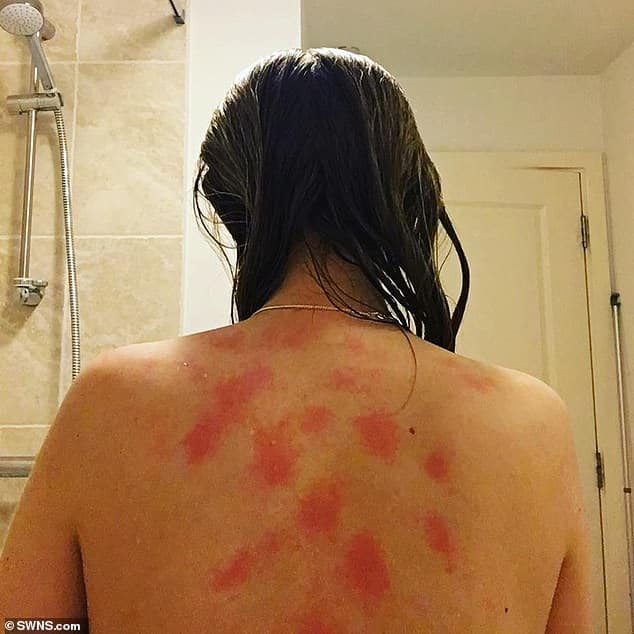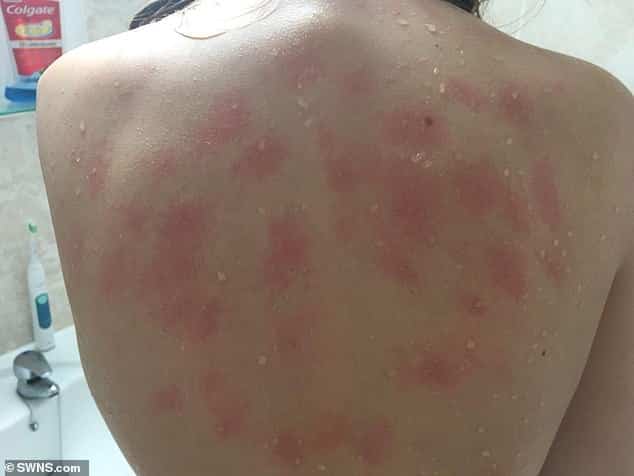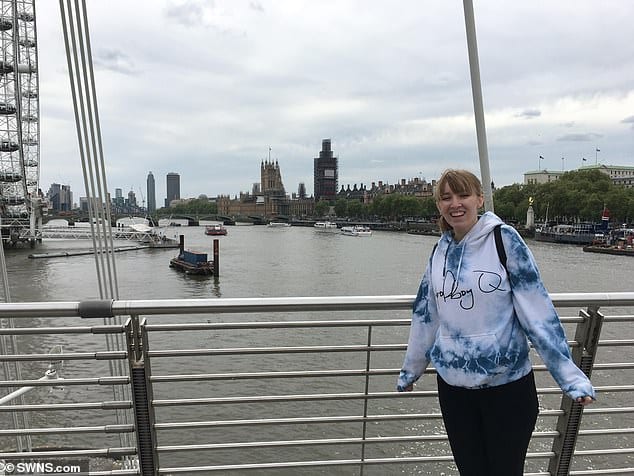Teen girl Lindsey Coubray has aquagenic urticaria, a rare condition that causes agonizing hives upon water contact, making showering, swimming, and going outside a struggle.
The teen girl experiences breathlessness and uncontrollable sneezing upon even slight water contact, requiring antihistamines for bathing.

Miss Coubray is among a group of 50 individuals worldwide diagnosed with this condition. She can only consume milk, as water triggers painful mouth sores.
She said: “I struggle to make it through a day at work and find it a challenge to do the things that most people my age take for granted.”

Miss Coubray described her symptoms as follows: “Whenever I have a shower, as well as sneezing, I am covered from head-to-toe in an itchy rash which looks and feels like a nettle rash, my nose burns, and my eyes become bloodshot and swollen. As well as having to avoid the rain, sunny weather can be equally as difficult. Warm weather is a particular challenge because I get hot, sweat and then end up with an intensely itchy rash all over my back, arms, head and chest. I also have to avoid going out in the rain and can no longer swim, which was something that I particularly enjoyed. Sometimes, if it has just stopped raining and I go outside, I can find myself feeling breathless.”
To manage her condition, Miss Coubray takes potent antihistamines and asthma medication to alleviate breathlessness.

Despite her best attempts, the teen girl still finds it challenging to lead a regular life.
As per Daily Mail: “I can no longer swim or go out in the rain or snow. I have to take showers for a shorter length of time and avoid having a bath. There is often a sense of disbelief, followed by questioning how this is even possible.”
She added: “People often wonder how I can be allergic to something that makes up 70 per cent of my body. There’s a lot of curiosity about it and people often ask how I manage to drink or to wash. I don’t think that sometimes people realise what I go through and how frustrating it can be to learn how to manage the symptoms.”
What is aquagenic urticaria?

According to the National Institutes of Health, aquagenic urticaria is a rare condition that causes hives when the skin touches water. Typically affecting more women than men, symptoms start around puberty. Hives are red and appear on the neck, chest, and arms, and may be accompanied by itching.
The cause of the condition is unknown but may be linked to a substance in water. Treatment options include antihistamines, UV light therapy, steroids, and bathing in sodium bicarbonate. However, due to its rarity, little is known about the most effective treatment.
Two years ago, the teen girl was diagnosed with aquagenic urticaria despite always experiencing sneezing during her showers.

She said: “When I was diagnosed I had reached the point where I was expecting it as it had become obvious what was causing my body to react. However, as the condition has worsened it has become difficult to come to terms with impact that is has on my life.”
In addition, the girl experiences postural tachycardia syndrome (PoTs), which results in her heart rate increasing significantly when transitioning from lying down to a standing position.
She experiences a heart rate of 175 beats per minute, dizziness, chest pain, and nausea from simply making her bed.
Paradoxically, maintaining proper hydration is among the most effective methods to alleviate PoTS.

She explained: “When diagnosed with PoTS, one of the key lifestyle changes recommended to ease the symptoms is to increase your daily intake of water as dehydration worsens PoTS symptoms. However, since developing PoTS, my water allergy has intensified. Having PoTS can often leave me feeling tired and low, so coming out in an allergic reaction to my own tears can feel like the final straw. I struggle to make it through a day at work and find it a challenge to do the things that most people my age take for granted.”
The teen girl has created an Instagram account called ‘aquagenic.urticaria’ to inspire other sufferers and raise awareness about the condition.

She said: “I am part of an online group for people with aquagenic urticaria from around the world and we are trying to raise awareness of this condition in the hopes that there will be more treatment options developed in the future. I felt as though I was a bit lost, but the group has helped to answer many of my questions and talking to people with the same condition has been really reassuring. They have also helped me to find ways to deal with symptoms. Staying positive, speaking to other people in the same situation as me and sharing or supporting others through my own online health page means that I am able to manage this condition and feel happy.”
Have you ever heard of this rare condition that makes someone allergic to their tears? Let us know in the comments.
